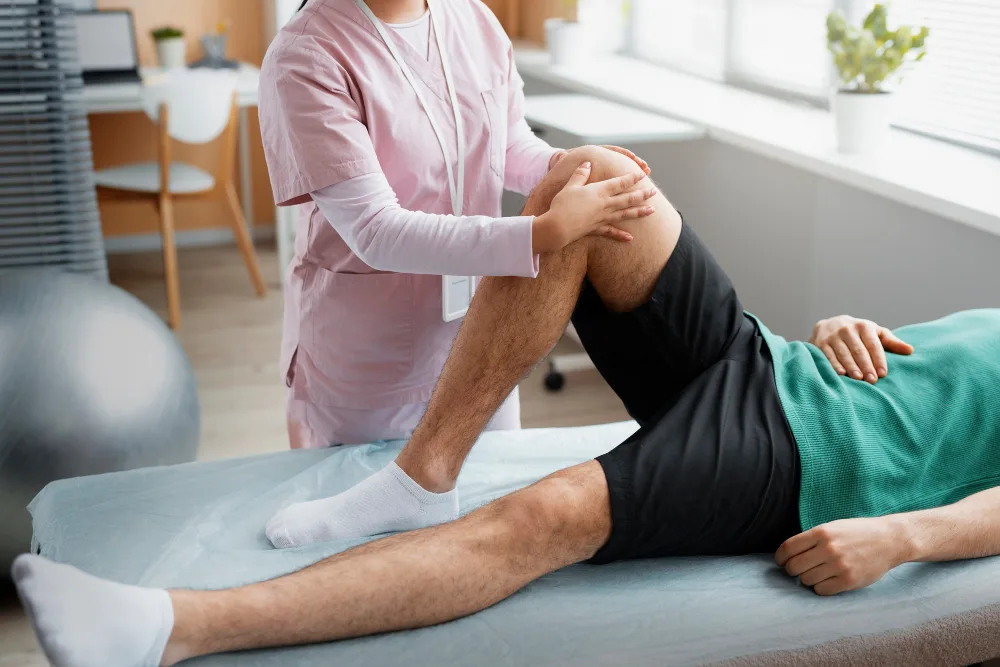Managing Pain Effectively During Knee Replacement Recovery
Category: Orthopedics
Recovering from knee replacement surgery is a critical phase where managing pain becomes essential to ensure a smooth and successful healing process. While the procedure itself addresses long-term joint pain and mobility issues, post-operative discomfort can become a hurdle if not handled properly.
This blog explores effective strategies to manage pain during recovery — from medication to physical therapy and home care tips — to help patients regain their strength with confidence.
Understanding Post-Surgical Pain
Pain after knee replacement surgery is normal and can range from mild to moderate in most cases. It results from tissue manipulation during surgery, inflammation, and the healing process itself. The intensity of pain can vary based on your age, overall health, and the type of surgical technique used (minimally invasive vs. traditional).
Managing this pain effectively allows patients to participate in physiotherapy and perform mobility exercises sooner, which is crucial for long-term outcomes.
Effective Pain Management Techniques
1. Medications
Doctors may prescribe a combination of pain relievers such as acetaminophen, NSAIDs, and opioids (short-term). In some cases, nerve block injections are used during surgery to reduce early postoperative pain.
2. Ice Therapy
Cold packs applied to the surgical area help reduce swelling and numb the pain. This should be done in 15–20 minute sessions multiple times a day.
3. Elevating the Leg
Keeping the leg elevated helps minimize swelling and discomfort. Make sure your knee is above the level of your heart when resting.
4. Physical Therapy
Regular physiotherapy sessions are crucial. Controlled movements restore joint function, strengthen surrounding muscles, and reduce stiffness.
5. Assistive Devices
Using walkers, canes, or braces can help distribute weight and reduce strain on the healing joint during the initial recovery period.
6. Mind-Body Techniques
Relaxation techniques like deep breathing, meditation, and even music therapy can help in managing pain perception and anxiety associated with recovery.
Why Choose Lokmanya Hospital for Knee Replacement Recovery?
At Lokmanya Hospital, we are recognized as a top hospital and best hospital for knee replacement treatment in India, known for our advanced orthopedic care and patient-centric rehabilitation programs. Our expert pain management specialists work closely with physiotherapists to create a customized recovery plan for each patient.
We leverage minimally invasive surgical techniques, multimodal pain relief protocols, and advanced post-operative care facilities. With decades of excellence, Lokmanya Hospital stands as a leading hospital for joint replacement and rehabilitation, offering seamless continuity of care from surgery to complete recovery.
Conclusion
Effective pain management is essential for successful knee replacement recovery. With the right blend of medications, therapies, and expert support, patients can accelerate healing and return to normal life faster. Choosing the right hospital plays a big role — and at Lokmanya Hospital, we’re committed to giving you the most comfortable, safe, and effective recovery possible.
FAQs
1. How long does the pain last after knee replacement surgery?
Most patients experience significant pain reduction within 2–3 weeks, though mild discomfort can last for a few months.
2. Is swelling a sign of poor recovery?
Not necessarily. Some swelling is normal and can persist for several weeks; however, excessive or worsening swelling should be evaluated.
3. Can I use a heating pad after knee replacement?
Generally, ice is recommended during early recovery. Heat therapy might be introduced later under medical guidance.
4. Do herbal or Ayurvedic remedies help with post-op pain?
Some herbal remedies may provide mild relief but should only be used after consulting your orthopedic surgeon to avoid interactions.
5. Will I need pain medication long-term?
Most patients can taper off prescription pain medications within a few weeks and switch to OTC options or none at all.
6. Is sleeping difficult after surgery due to pain?
Yes, some patients struggle with sleep initially. Adjusting sleeping positions and using pillows can help ease discomfort.
7. Are there any side effects of pain medications used post-surgery?
Common side effects include drowsiness, nausea, and constipation. Always follow dosage instructions and inform your doctor of any concerns.
8. What if my pain increases during physical therapy?
Some discomfort is expected, but sharp or escalating pain should be reported immediately to your therapist or surgeon.
9. Can pain be a sign of implant failure?
Persistent or unusual pain months after surgery could signal complications and should be assessed by your surgeon.
10. How can family members assist in pain management?
They can help with medication schedules, physical support, emotional encouragement, and ensuring proper rest and diet.







